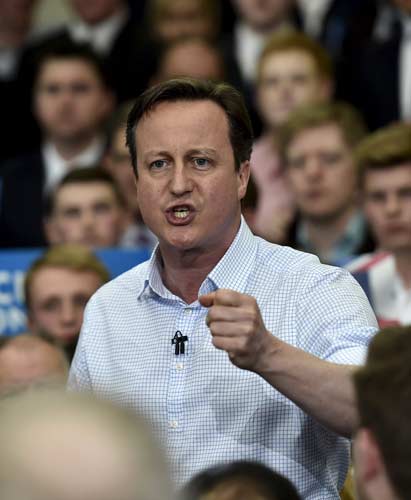UK's Cameron on track to return to power as PM - exit poll
(Agencies) Updated: 2015-05-08 09:17
 |
|
Britain's Prime Minister David Cameron addresses party activists at a campaign rally in Carlisle in northern England May 6, 2015. [Photo/Agencies] |
LONDON - Britain's Conservative party is poised to secure an effective parliamentary majority, a BBC projection showed on Friday with more than 70 percent of results declared.
Prime Minister David Cameron's Conservatives are on course to win 325 seats in the 650-seat parliament, which amounts to a working majority because four lawmakers from Northern Ireland's Sinn Fein party will not vote.
An exit poll released on Thursday night as voting ended gave the Conservative 316 seats in the lower house of parliament and the main opposition Labour Party 239.
Labour leader Ed Miliband said on Friday that his party had suffered a "very disappointing" night after election results showed it was on track to lose seats and lag far behind Prime Minister David Cameron's Conservatives.
"This has clearly been a very disappointing and difficult night for the Labour Party," he told supporters after retaining his own parliamentary seat in Doncaster, northern England.
Effectively conceding defeat, Miliband added that he was "deeply sorry" for what had happened elsewhere in Britain, especially in Scotland where he said a surge of nationalism had overwhelmed the Labour party.
Such a result means Britain is likely to face a historic in-out European Union membership referendum in the next two years and that billions of pounds will be cut from government spending to eliminate the budget deficit in the world's fifth largest economy.
Sterling jumped to a one-week high after the poll. The pound jumped nearly 2 US cents to $1.5430 in early Australasian trade, hitting its strongest since April 30.
UK election exit polls have a good track record but the large number of parties competing this time has raised the potential for error. It will be well into Friday before final results are announced.
The poll, conducted for Britain's national broadcasters, suggests Cameron will have multiple options to form a government, perhaps with the support of either the Liberal Democrats, his current coalition partners, or Northern Irish unionists or both. He could also try and go it alone.
- UK votes in most unpredictable election in decades
- China-UK relations likely unaffected by election
- Labour and Conservatives tied again ahead of UK election: poll
- Official: Election outcome won't change Britain's policy on China
- Plan unveiled for HK leader's election
- British election focused on state of UK finances






